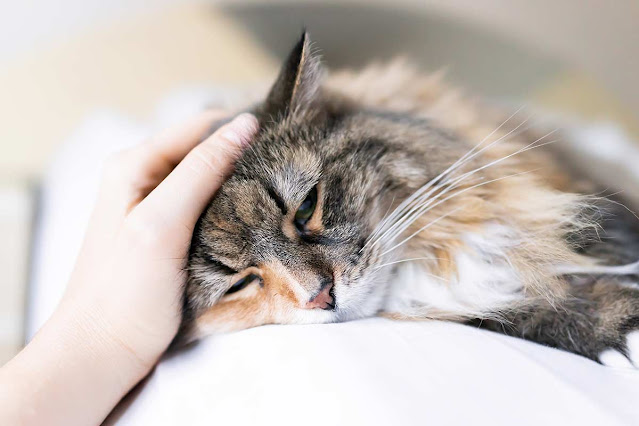Similar to humans, senior cats may exhibit reduced energy levels, altered interests, and age-related conditions like arthritis. These changes are natural and, with appropriate adjustments to their care and regular veterinary check-ups, senior cats can continue to enjoy their golden years.
However, some senior cats may also display changes in behavior. They might lose interest in playtime, avoid physical contact, or even exhibit aggressive behavior. Others may appear unusually disoriented, especially when faced with sudden environmental changes. Determining whether these changes are a normal part of aging or if it's time to seek veterinary assistance can be challenging.
Forgetting litterbox training
If your once well-trained cat starts urinating outside of their litterbox, it could be attributed to age-related changes. Elderly cats may experience a decline in cognitive function, often referred to as "cognitive dysfunction" or "cat dementia."
During this time, your cat may become disoriented and forget the location of their litterbox or where they should eliminate. While there is little you can do to reverse this cognitive decline, you can help by making the litterbox easily accessible to them. For instance, if they consistently urinate in a specific spot, consider moving the litterbox to that area. Patience and understanding are crucial if they still struggle to use the litterbox.
However, it's important to note that inappropriate elimination can also indicate other underlying conditions, such as feline urinary tract infections, constipation, or even vision impairment. Therefore, it is advisable to have your cat examined by a veterinarian to rule out any medical issues before attributing the behavior solely to age-related confusion.
Confusion or disorientation
Feline cognitive dysfunction can manifest in various ways, including confusion. Elderly cats with this condition may exhibit forgetfulness of their litterbox training and display additional symptoms such as increased vocalization, disorientation, or changes in their personality.
They might withdraw from interactions with people and other animals, showing reduced interest in their surroundings. While there is no cure for feline cognitive dysfunction, providing a safe and secure environment is crucial in caring for older cats. It's essential to be patient and understanding with their new behaviors.
If you have concerns or are unsure about your cat's condition, it's advisable to consult a veterinarian. Some behavioral changes associated with cognitive dysfunction may have underlying symptoms that can be treated or managed.
Not responding to loud noises or their name
If you observe that your senior cat no longer responds to their name being called or fails to react to unusual or loud noises, it could be an indication of hearing loss. It's important to note that they haven't necessarily forgotten their name or become immune to sounds; they simply have difficulty hearing them. Deaf cats often compensate for their hearing loss by relying on their other senses, which can make their deafness go unnoticed.
Additional symptoms of hearing loss in older cats may include excessive meowing or signs of disorientation. If you suspect that your cat's behavior has changed and they might be experiencing hearing problems, it's recommended to take them to the veterinarian for a thorough examination. This will help determine if their condition is due to natural age-related hearing loss or if there is an underlying issue such as an ear infection that can be treated.
Sleeping more or less than usual
A change in sleeping habits is another common behavior seen in older cats. Elderly cats tend to sleep more than they did when they were younger, mainly due to a decrease in energy levels. It's essential to provide them with a quiet and peaceful sleeping area and allow them to rest whenever they feel like it. When caring for older cats, it's important to adjust their diet to match their changing energy requirements to avoid excessive calorie intake. Consider trying a specially formulated senior cat food like Purina One Senior 7+, which is lower in calories compared to regular varieties.
On the other hand, some senior cats may appear to sleep less during the night and exhibit restlessness. This behavior is often compensated by increased daytime sleep. As long as they are getting sufficient overall sleep, there is typically no cause for concern. However, if you have any doubts or concerns, it's always best to consult with a veterinarian for guidance and assurance.
Playing less
A common behavior seen in older cats is a decreased interest in playing. Their favorite toys may no longer captivate them, and they may quickly become bored and prefer to nap instead. While this change in play behavior can be disappointing or concerning, it is quite normal for senior cats.
Younger cats, especially kittens, use play as a means to explore the world and express their instincts. As cats age, their need for active play diminishes, coupled with changes in energy levels, resulting in a reduced desire to engage in play.
Eating differently
Cats are known for their selective eating habits, and if your senior cat shows a significant loss of appetite, it may indicate age-related changes affecting their appetite.
While certain changes in appetite may be normal, such as decreased activity levels requiring less food, it is always prudent to consult a professional to ensure the well-being of your cat.
Aggression
If your elderly cat exhibits increased aggression towards you or other animals, it may stem from age-related factors. As cats grow older, they may become more set in their ways and have less tolerance for disruptions to their routine or the presence of newcomers in the household.
Caring for senior cats can sometimes be worrisome and stressful. If you observe any unusual or out-of-character behaviors, do not hesitate to reach out to your veterinarian for professional advice and guidance.



